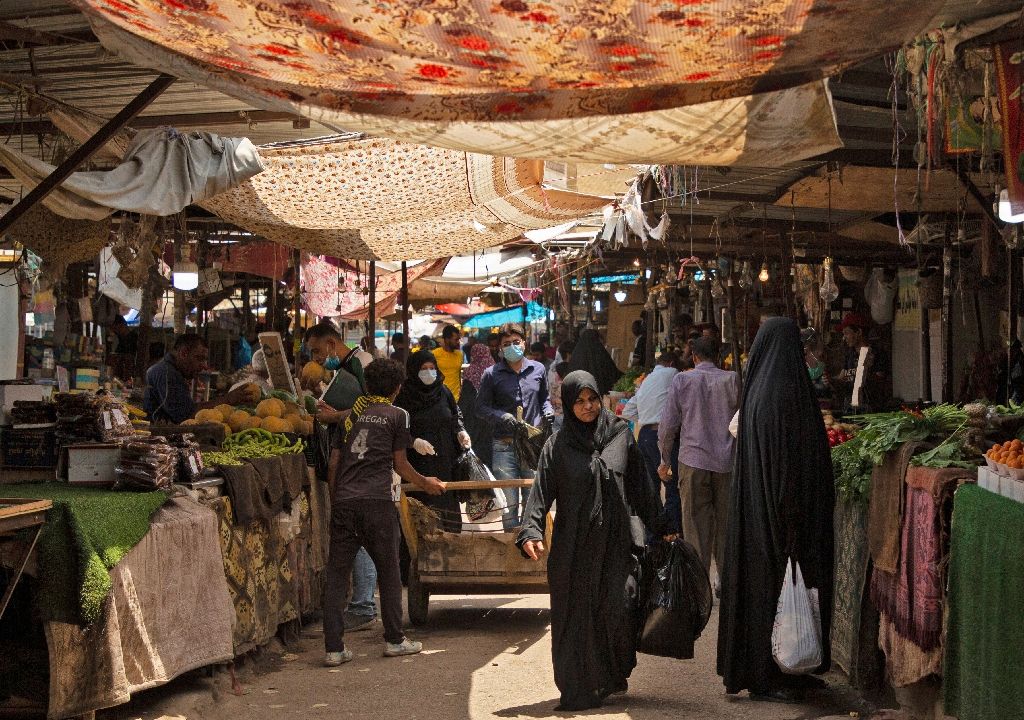As Iraq lockdown chokes off imports, local businesses thrive
()
(AFP)
In Iraq, a national lockdown to halt the coronavirus pandemic has found some unexpected fans: local businesses who no longer have to compete with Turkish, Iranian or Chinese imports.
Those countries, as well as Saudi Arabia, Jordan and Kuwait, typically flood Iraqi markets with inexpensive products at prices local producers can’t compete with.
That includes everything from cars and computers to frozen chicken and even Iraq’s national fruit, dates, which in recent years were more often imported from the Gulf than plucked from local palm trees.
Local producers were left in the dust, struggling to compete given their expensive raw materials and low outputs compared to the enormous quantities being imported.
Not anymore, said Amin Qassem, who has operated an ice cream factory in the oil-rich province of Basra since 2006.
“The coronavirus crisis has allowed us to prove ourselves on the Iraqi market,” he said, relishing the sweet moment.
Qassem’s 3,000 employees across six factories pack 144,000 ice cream cones and wafer sandwiches every hour.
“When there was cheap ice cream coming in from Iran, I had to lower my prices to sell so that my ice cream wouldn’t be stuck melting in storage,” said Qassem.
“Now, I can sell at higher prices. We were able to win back the same markets where imports once crushed us.”
– Out with the imports –
Experts have long warned that oil-rich Iraq must diversify its economy to insulate it from the swings of the energy market.
As OPEC’s second-biggest oil producer, it relies on oil exports to fund more than 90 percent of its state expenses.
This year, with oil prices crashing to around a third of their 2019 prices, Iraq will struggle to keep its government running, pay salaries or import essential goods.
The International Monetary Fund projected Iraq’s imports of goods and services would drop from $92 billion in 2019 to $84 billion this year and to $81 billion in 2021.
Diversification has been a tall order for a country with a fledgling private sector, under-developed banking system and a weak customs regime that makes it cheaper to import than to produce.
But with coronavirus restrictions, all that could change.
As part of Iraq’s lockdown measures put in place in March, it has officially closed its federal border posts with Iran, Turkey and Kuwait to both people and goods.
Imports through Um Qasr, the southern port through which Iraq brings in crucial food and medicine, have dropped.
As a result, Iraq is importing less according to data from its trade partners.
It bought $973 million worth of Chinese goods in December but that dropped to $775 million by April, according to the Chinese General Administration of Customs.
Imports from Iran also fell from $450 million per month before the coronavirus pandemic to $300 million currently, according to Hameed Husseini, a member of the Iran-Iraq Chamber of Commerce.
Iraq is also taxing imports more stringently.
Its Customs Office attributed “the notable rise” in customs revenues — from $2.5 million in the first half of April to $7.3 million in the first half of this month — to “tougher monitoring measures”.
Higher duties force Iraqi retailers to bump up the prices of imported goods, so local businesses can better compete in the markets.
– Fishermen catch a break –
Hadi Abbud, who owns a plastics factory in Basra, has already seen an exponential surge in orders for plastic tubing, usually brought in from China.
His factory has been working 24/7 to mould, cut and polish thick plastic cylinders proudly stamped “Made in Iraq.”
“These days, I’m getting new orders for plastic tubes faster than I can even produce them,” said Abbud, his white hair meticulously combed back.
Sales are so good he is planning to recruit another 50 workers for his 100-man factory.
“The situation has really changed,” Abbud said, his smile barely concealed by the face mask he wore as part of mandated social distancing in his factory.
Even at sea, the difference is notable.
Basra’s beleaguered fishermen have long competed with Iranian and Kuwaiti rivals in the wedge of Gulf coastline that is Iraq’s only access to the sea.
“Starting around a month ago, there have been many more fish,” said Mohammed Fadel, who sells his daily catch at a stand in Basra’s downtown market.
“The Kuwaiti and Iranian fishermen aren’t coming out anymore,” he told AFP, leaving the Gulf almost exclusively to gleeful Iraqi fishers.
In Basra’s markets, tables are now heaving with rows of silvery fish and buckets of prawns, carefully examined by shoppers in gloves and masks.
The catches are so plentiful that a kilogramme of “zubeidy,” a local sea bream, has dropped from $16 to $9.
“The number of fish — and the prices — are just extraordinary,” said Fadel.
Dawood Salman
Disclaimer: Validity of the above story is for 7 Days from original date of publishing. Source: AFP.


